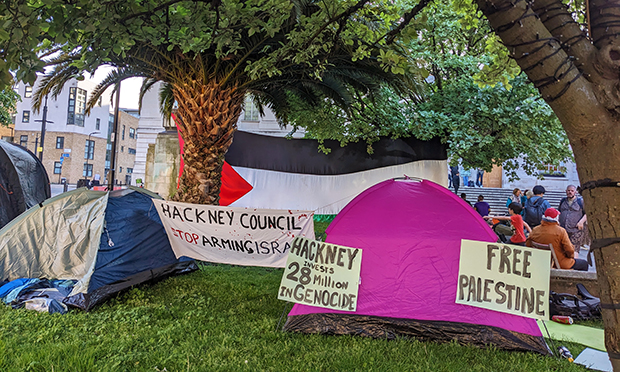Pro-Palestine camp outside Hackney Town Hall to wind up – as protesters mull ‘change in tactics’

Camped out: protestors at Hackney Town Hall, Friday 10 May 2024. Photograph: Hackney Citizen
Hackney’s long-running divestment camp is to end today, after the protesters said they would be “forced to change tactics” if the council fails to meet their demands.
The camp, which has been outside Hackney Town Hall on Mare Street for the past two months, will wind up on the same day that its members will deliver speeches in front of the council’s pensions committee.
The deputations will call on the council to divest its investments in Elbit, an Israeli arms company.
The campers said they would “use the opportunity to highlight the very real, mortal consequences of products made by firms in which the fund invests”.
One of the organisers, Max Geller, said this meeting is the “end of the road” for the current protest strategy, but that “the end of the camp is not the end of the campaign, by any means”.
Geller said that if the council decides not to divest after tonight’s meeting, then “we know that the pleas of residents – who simply want not to be complicit in Israel’s crimes – have not been made clear enough by this encampment, and we will need to change tactics”.
The protesters previously told the Citizen that they would remain outside the Town Hall until their demands were met.
They said more than 100 individuals have stayed overnight at the camp during its stay.
The campaign is also calling for Hackney Council to divest from “all companies complicit in Israel’s human rights abuses, to sever Hackney’s twinning relationship with the Israeli city of Haifa, and to twin with a Palestinian town instead”.
“These demands were met with a degree of receptibility, initially,” it said, with Hackney Mayor Caroline Woodley signalling to them “an openness to ‘ethical divestment’”.
In June, Mayor Woodley told the Citizen that “asserted support for ethical divestment” during a meeting with the camp’s members.
The camper’s statement continued: “But this has so far come without material commitment – and comes with a caveat that the council is ‘constrained in the action we’re able to take unilaterally’”.
Hackney Council was approached for comment following the announcement of the divestment camp’s closure, but it said it had no further comment to make.
When the camp began, the council said: “We know that some residents and communities have concerns about some of Hackney pension fund’s investments.
“Responsibility for the pension fund, which pays the pensions of retired key workers, sits with Hackney’s pensions committee, which has a legal duty to ensure the pension fund generates sufficient returns to keep paying these benefits.
“Its investments are in standard pooled funds, where the pension fund does not hold direct stock in any company.
“These indirect investments in companies active in Israeli settlements represent about 0.1 per cent of the pension fund’s value.
“While it is unlikely that the pensions committee could make changes without risking breaching Law Commission guidance, responsible investment remains at the forefront of the committee’s agenda.”
Hackney Council previously divested stocks in Russian companies following the country’s invasion of Ukraine.
Regarding Hackney’s twinning relationship with Haifa, a Town Hall spokesperson said: “The council is twinned with Suresnes, Haifa and St George’s.
“The relationship with Haifa is a civic one dating back to 1968.
“The council does not have an active role in managing the links; they are self-sustaining based on the community connections that have built up over many years.”
